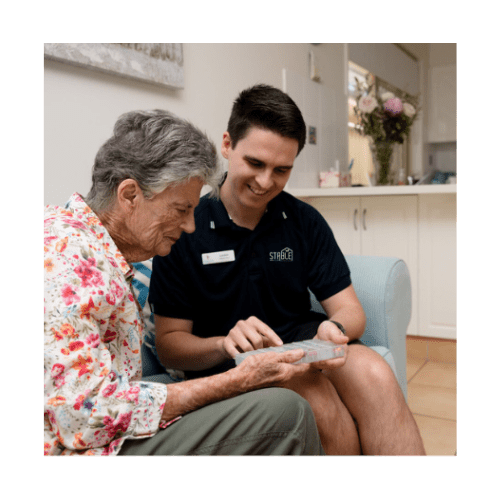Exactly How In Home Treatment Givers Address the Unique Difficulties and Psychological Demands of Families Looking For Support for Their Family Members
In-home caregivers play a crucial role in navigating the intricacies encountered by family members seeking assistance for their enjoyed ones. By understanding special family members characteristics and providing customized psychological assistance, these specialists not just address instant care demands yet additionally foster an environment of trust and open interaction (in home caregivers).
Understanding Family Dynamics
Comprehending household characteristics is critical for supplying effective in-home care, as each household runs within a distinct set of connections and interactions. These dynamics include numerous components, consisting of interaction designs, duties, and power frameworks that affect exactly how treatment is delivered and received. The caretaker needs to recognize these aspects to guarantee that treatment strategies line up with the family members's expectations and values.
Different households might show distinct patterns of interaction, such as joint approaches or hierarchical frameworks. In some families, a primary decision-maker may hold significant impact, while in others, decisions may be extra autonomous. Comprehending these patterns helps caregivers customize their approaches to fit the family members's specific needs.
Furthermore, social backgrounds play an important role in forming family dynamics. Caretakers should be culturally qualified, acknowledging and respecting diverse methods and ideas that may influence treatment preferences.
Inevitably, a detailed understanding of household characteristics facilitates boosted communication, promotes count on, and improves the caretaker's ability to support the family members successfully. By identifying the complex web of relationships and duties, caretakers can create a helpful environment that promotes well-being for both the individual obtaining care and the household as a whole.
Providing Emotional Support
Supplying psychological assistance is a vital part of at home care that substantially enhances the well-being of both the private receiving care and their relative. In the context of caregiving, emotional assistance involves active listening, compassion, and recognition of sensations. Caregivers are educated to acknowledge the emotional struggles that households face, such as sense of guilt, seclusion, and anxiousness, and to supply a caring existence that reduces these problems.
By promoting open interaction, caregivers produce a risk-free area for household participants to express their issues and fears. This dialogue not just urges emotional launch yet additionally enhances trust fund in between the caretaker and the family. Furthermore, caregivers can use sensible approaches to assist families handle tension and advertise strength.

Eventually, the emotional support offered by at home caregivers enhances the quality of life for both customers and their households, advertising an extra compassionate and understanding caregiving environment. This alternative strategy guarantees that emotional requirements are dealt with alongside physical health considerations.
Handling Daily Treatment Tasks
Managing day-to-day treatment jobs is a vital aspect of at home care that guarantees people receive the support they need to keep their health and wellness and independence. Caregivers play a vital function in helping with activities of everyday living (ADLs), that include bathing, clothing, brushing, and meal preparation. By tackling these responsibilities, caretakers help ease the psychological and physical concerns that family members might encounter while caring for their liked ones.
Along with individual treatment, caretakers are likewise entrusted with drug monitoring, ensuring that clients comply with recommended Discover More Here does and routines. This oversight is important for preserving wellness and stopping adverse results from missed out on or wrong medications. Additionally, caregivers often aid with wheelchair, giving support for clients moving their homes, therefore decreasing the threat of drops and improving general safety.

Cultivating Open Communication
Reliable administration of day-to-day treatment tasks usually depends upon the high quality of communication between caregivers, clients, and their family members. Open communication fosters a setting where issues, preferences, and feedback can be openly traded, making certain that care is customized to fulfill individual demands. Caregivers must focus on routine check-ins with both clients and their households, promoting conversations that deal with any kind of concerns or modifications in care requirements.
Using various communication methods-- such as in person meetings, telephone call, and written updates-- can enhance understanding and provide family members with peace of mind. It's necessary for caretakers to proactively listen, demonstrating compassion and respect for the emotional landscape of the family members. Motivating questions from member of the family can also assist make clear treatment strategies and enhance the caregiver's commitment to openness.
Moreover, preserving open lines of interaction makes it possible for caregivers to identify and respond immediately to any kind of shifts in a customer's health and wellness condition or psychological well-being. This aggressive method not only reinforces the caregiver-client dynamic but also empowers family members to take part actively in the treatment process. Ultimately, promoting open communication is vital for improving the top quality of at home care and advertising an encouraging atmosphere for all included.
Building Trust Fund and Relationships
Depend on is the foundation of successful in-home treatment, as it develops a foundation for purposeful relationships in between caregivers, customers, and their families. Structure this trust fund needs regular, clear in home caregivers interaction and a genuine commitment to the health of those included. Caregivers must demonstrate dependability with punctuality, adherence to care plans, and responsiveness to the demands and choices of customers.
To foster depend on, caregivers should take part in active listening, making sure that family members really feel heard and recognized. This involves not only addressing immediate problems however also anticipating future requirements, therefore empowering households and improving their feeling of control. Establishing rapport with shared experiences and respectful communications can additionally strengthen these relationships.
Moreover, caretakers should be trained to recognize and resolve the psychological complexities dealt with by families. By revealing empathy and empathy, they can relieve concerns and unpredictabilities, enhancing count on. Regular updates and check-ins with relative can likewise boost transparency, permitting them to feel involved and educated regarding their enjoyed one's care.
Ultimately, constructing trust and nurturing connections in in-home treatment is a joint procedure that substantially impacts the high quality of treatment provided, promoting a helpful setting that benefits everybody entailed.
Conclusion
In-home caretakers play an essential duty in addressing the distinct obstacles and psychological needs of check my blog households. By recognizing family dynamics, providing emotional assistance, and promoting open interaction, caretakers enhance the overall caregiving experience. Their capability to handle day-to-day treatment jobs while constructing trust fund and strong relationships cultivates a helpful environment for clients and their households. Inevitably, the thoughtful involvement of caretakers considerably adds to boosted health and strength for those browsing the intricacies of caregiving.
Recognizing household dynamics is crucial for offering effective at home care, as each family runs within an one-of-a-kind set of connections and interactions.Supplying emotional assistance is an important element of in-home treatment that substantially improves the well-being of both the specific getting care and their household participants. By taking on these responsibilities, caretakers help alleviate the physical and emotional worries that families may deal with while caring for their loved ones.
Reliable management of everyday treatment tasks often hinges on the high quality of interaction between caretakers, customers, and their families - ndis support coordinator.Depend on is the cornerstone of successful at home treatment, as it establishes a structure for significant connections in between caregivers, clients, and their family members